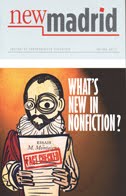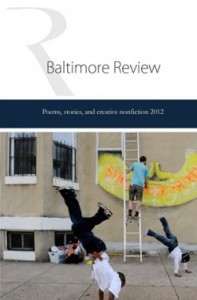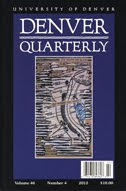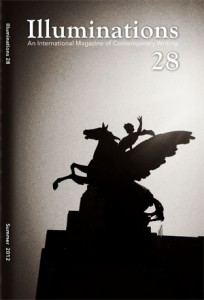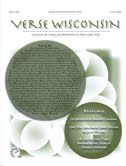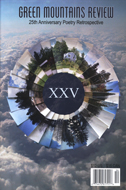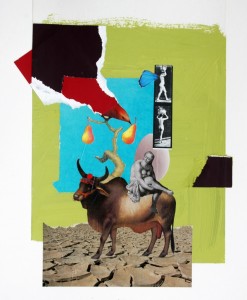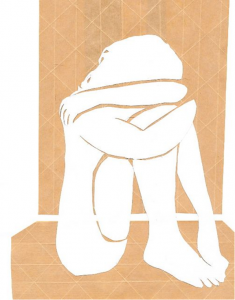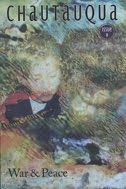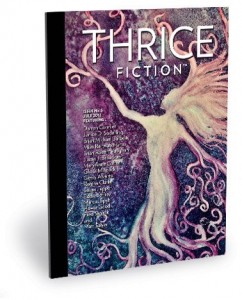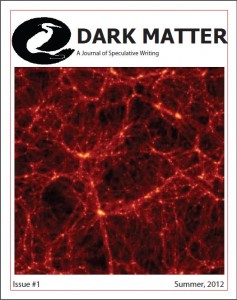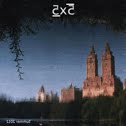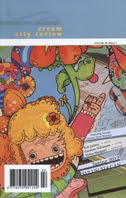They say not to judge a book by its cover, but to be honest, I do it all the time. Of course the work in a journal always ends up speaking for itself, but I’d be lying if I said first impressions didn’t influence the way I approach new lit mags. In this case, between the title and the cover art, Salamander had me feeling a bit uneasy.
NewPages Blog
At the NewPages Blog readers and writers can catch up with their favorite literary and alternative magazines, independent and university presses, creative writing programs, and writing and literary events. Find new books, new issue announcements, contest winners, and so much more!
Salamander – Summer 2012
Spread the word!
Salt Hill – 2012
The allure of the Spring 2012 issue of Salt Hill starts with an enticing cover, a black and white illustration by Aaron $hunga where a character named “Mr. Rhombus” is told to get ready “to enter Xenocave.” More of $hunga’s graphics detail a fantastical story in the concluding entry in Salt Hill. As if that graphic wasn’t enough of a warning about the kind of fiction contained in this issue, the editors’ note reads, “The twenty-ninth issue of Salt Hill is evidence of how capricious and flimsy our perceived world is, how gray and clouded the separation between phenomenological reality and the science fictions looming behind it. Or in front of it. The fantasies stuck between its dark matter. Either which way, the work in this issue pursues out-there dimensions.” Perhaps because of this dipping into strange avenues, the best work in this edition is the poetry, as well as amazing artwork done in ink on paper by Faye Moorhouse. Continue reading “Salt Hill – 2012”
Spread the word!
Snail Mail Review – Spring 2012
Snail Mail Review prides itself on being a print magazine that maintains “mail-only interaction” with its writers. Interestingly, although this magazine revels in the virtues of print, one main reason that it attains the amount of quality work as it does might be because of its online presence. Although the magazine is amateur-looking (they hope to move from saddle-stitching to perfect-binding soon), Snail Mail Review is professional in the way that it belongs to LinkedIn, has a Facebook page, Gmail address, and many calls for submission on literary websites and blogs. These calls work. In the introduction to this issue, Editor Christine Chesko writes of a gigantic stack of submissions sitting on a chair in Co-Editor Kris Price’s house. Continue reading “Snail Mail Review – Spring 2012”
Spread the word!
Still Point Arts Quarterly – Summer 2012
Perhaps it’s only my personal attention span, but I believe that focused collections of any art can be easily perused and set aside for any number of reasons. A collection of one type of literature or art must be read or looked at one piece at a time and held for reflection. A combination allows for any mood and many returns. Such is the Still Point Arts Quarterly’s summer issue and their idea to showcase their current site exhibit. Continue reading “Still Point Arts Quarterly – Summer 2012”
Spread the word!
THEMA – Summer 2012
A great literary magazine is one that makes you think and ponder and take several moments out of your busy life to just appreciate art and life. Thema offers some absolutely remarkable writing that grabbed me and forced me to sit and reread several times. I found myself thinking about the economy, relationships, writing, reading, art, and even the galaxy at large.
Spread the word!
U.S. 1 Worksheets – 2012
Nearly 50 years ago, a few poets gathered near Princeton, NJ, to read their poems to each other. According to the editors of U.S. 1 Worksheets, this small group of poets formed the U.S. 1 Poets’ Cooperative, and many of the original poets are still involved in the Cooperative and continue to submit to the journal, which is headquartered in the Princeton suburb Kingston, NJ. Continue reading “U.S. 1 Worksheets – 2012”
Spread the word!
Watershed – 2011
Watershed leans in the environmental direction, at least in this issue. Given that it’s a journal celebrating the Susquehanna Watershed, this makes sense. The issue includes poetry, narrative nonfiction, and an oral history focused on contemporary Native Americans living in Pennsylvania, a state that doesn’t currently recognize any existing Indian tribes within its borders (yes, there’s some bitterness there, as expected). Black and white photos dress up the text of this slim volume. Continue reading “Watershed – 2011”
Spread the word!
What’s New in Nonfiction?
In a creative introduction to the nonfiction feature in New Madrid, Editors Lisa Luton and Elena Passarello address the ongoing debate in nonfiction writing—how far from the truth can a writer wander.
The introduction is a dialogue between two characters, Memoir and Essay. At first the two argue. Essay argues that “essayists try to create a new, fully realized contract with each piece of writing, one that is grounded and centered in art rather than proving anything. The trying is what turns us on, and hopefully what turns readers on. Why put art first? Because art is greater than fact.” To which Memoir says, “I think we are the purveyors of the existing, deeper truths of the world. We are not here to make art out of facts, but to find an portray the art that is already there.”
However, as they carry on, they realize that they have a lot in common with each other and that “Maybe nonfiction is about both the trying and the answering, and, just like with a painting, it is the audience’s interpretation of the art that makes the true meaning.” Essay goes on to say that “the greatest thing we can learn from all these submissions is that we nonfictioneers might have core values that go in opposite directions, but there’s enough room under this genre umbrella for all of us.”
This nonfiction feature in New Madrid includes both essays and memoirs—and pieces that perhaps can’t be defined one way or the other. Writers featured include Kim Trevathan, Kirby Wright, Matthew Gavin Frank, Sean Christopher Lewis, Frankie Finley, Briandaniel Oglesby, Sara B. Levi, Vincent Scarpa, Daniel Aristi, John Proctor, Tom Elliot, and Alison Stine.
Spread the word!
Baltimore Review – Summer “Heat” Winners
The Baltimore Review editors have announced the winners of their Summer Issue “Heat” theme contest as selected by Final Judge Jean McGarry, Professor and Co-Chair, The Writing Seminars, Johns Hopkins University. All winning works appear in the Summer Issue online and will appear in the review’s annual print collection in 2013.
First Place
Ann Cwiklinski
“Selkie” – Short Story
Second Place
Moira Egan
“Hot Flash Sonnet” and “Sisters in Sweat Sonnet” – Poems
Third Place
Claudia Cortese
“The field curdles” and “Slippery Banjo” – Poems
Honorable Mention
Jennifer Fandel
“Heat Wave” – Poem
Spread the word!
Podcast :: Jane Borden Interview
Virtual Memories Show is a monthly podcast hosted by Gil Roth about life and books, including interviews with authors about books that have helped shape their lives. The August episode features a conversation with Jane Borden, improv junkie, standup comic, and author of I Totally Meant To Do That (2011), a memoir about how she went from being a North Carolina debutante to a Brooklyn hipster.
Spread the word!
Petition to Save UNO Press
From Marthe Reed, Skip Fox, and Anny Ballardini to all authors, translators, editors, scholars, and readers of fine literature:
As you may well have already heard, the University of New Orleans Press has just recently been put on “hiatus” and its innovative and energetic editor, Bill Lavender, fired. The presumptive reason concerned budget constraints, but in fact the Press was cost free, and gained UNO a significant reputation for the past five years (since Bill Lavender’s tenure). It also published an international range of writers, many of them prize winners or otherwise notable. As you are probably aware, Bill Lavender had taken a rather lifeless creature in 2007 and enlivened it with over 80 publications, a remarkable achievement.
In support of UNO Press, Bill Lavender, fine literature and good reading, please consider signing a petition indicating your support. The petition has many more details concerning the recent (5-6 day) history of events.
Sign the petition here: Petition Site
There was a significant item in The Times Picayune and one in Inside Higher Ed in the past few days, as well as this article in the Chronicle of Higher Education.
You may also wish to pass this information on to other writers through a blog, facebook, etc., or even write personal letters to the President and Provost of UNO:
Provost Louis Paradise
[email protected]
President Peter Fos
[email protected]
Spread the word!
Master Class with Ron Silliman
The Chicago School of Poetics offers online and F2F workshops for writers who “feel the need for more specialized instruction” beyond the traditional academic program.
 Currently offered is a master class workshop with poet Ron Silliman: “’What does not change / is the will to change’ : Embracing transformation in writing poetry”. The one-day (Oct. 20) workshop will run for three hours (1-4pm) in an online, video-conferenced classroom and is limited to ten students.
Currently offered is a master class workshop with poet Ron Silliman: “’What does not change / is the will to change’ : Embracing transformation in writing poetry”. The one-day (Oct. 20) workshop will run for three hours (1-4pm) in an online, video-conferenced classroom and is limited to ten students.
In addition to this master class and weekly salons, online classes offered include Poetics (I, II, & III), Documentary Poetics, Risk: Writing at the Edge, Erasure to Automatism, The Poetry of Cubism, Queer Poetics, Working Poets, Personal Archeology, Publishing, The Poem as Remix, Visual Poetry, and Hybrid Texts.
Spread the word!
Novella Contest Winner: The Malahat Review
In the most recent issue, The Malahat Review publishes Naben Ruthnum’s novella “Cinema Rex” as the winner for the 2012 Novella Contest. His entry was selected from 215 submissions by three judges: Terence Young, Valerie Compton, and Gabriella Goliger. In addition to publication, Ruthnum was awarded $1500 CAD prize money.
Judges said the following about his piece: “[it] incorporates footnotes to explore a different kind of omniscience. The story, set in exotic Mauritius, follows three adolescent boys on the opening day of the town’s newest theatre, Cinema Rex. They skip school when they discover their teacher slumped over on his desk in a drunken sleep, and from there events build to the evening’s entertainment, a translated version of ‘The Night of the Hunter.’ Throughout, the footnotes move us forward in time to the boys’ adult lives, creating a kind of sympathetic cosmic irony. The language of ‘Cinema Rex’ is precise, the tone engaging, and the characters compelling. It has an unstoppable momentum, often surprising details and vivid dialogue. This is a novella that has been pared to essentials, with every element working together.”
A web exclusive interview with Ruthnum about his prize can be found here.
Spread the word!
Editor Changes: Denver Quarterly
In the current issue of Denver Quarterly, Editor Bin Ramke announces the issue as his last as editor. After serving for seventeen years, he expresses his gratitude for the writers over the years.
“It can be an enormous amount of work to publish a literary journal four times per year,” he says in his editor’s note, “but when that work is shared it can also be a joy, and it was. I trust that joy will be part of Laird Hunt’s experience as he negotiates the burdens and opportunities of editorship, and I know he will renew the energy of the Denver Quarterly as he guides it toward and past its fiftieth year.”
Spread the word!
American Life in Poetry
American Life in Poetry provides individual readers, newspapers and online publications with a free weekly column featuring contemporary American poems. The sole mission of this project is to promote poetry: American Life in Poetry seeks to create a vigorous presence for poetry in our culture. There are no costs for reprinting the columns; they do require that you register your publication on their site and that the text of the column be reproduced without alteration. Below is the most recent column, with introductory comments from Ted Kooser.
******************************
American Life in Poetry: Column 385
BY TED KOOSER, U.S. POET LAUREATE
I am very fond of poems that don’t use more words than they have to. They’re easier to carry around in your memory. There are Chinese poems written 1300 years ago that have survived intact at least in part because they’re models of succinctness. Here’s a contemporary version by Jo McDougall, who lives not in China but in Kansas.
Telling Time
My son and I walk away
from his sister’s day-old grave.
Our backs to the sun,
the forward pitch of our shadows
tells us the time.
By sweetest accident
he inclines
his shadow,
touching mine.
American Life in Poetry is made possible by The Poetry Foundation, publisher of Poetry magazine. It is also supported by the Department of English at the University of Nebraska-Lincoln. Poem copyright ©2001 by Autumn House Press. Jo McDougall’s most recent book of poems is Satisfied with Havoc, Autumn House Poetry, 2004. Poem reprinted from The Autumn House Anthology of Contemporary American Poetry, 2nd ed., 2011, by permission of Jo McDougall and Autumn House Press. Introduction copyright © 2012 by The Poetry Foundation. The introduction’s author, Ted Kooser, served as United States Poet Laureate Consultant in Poetry to the Library of Congress from 2004-2006. We do not accept unsolicited manuscripts.
Spread the word!
New Editor :: Illuminations
The new issue of Illuminations marks the first issue for new Editor Meg Scott Copses. “In this first year as new editor,” she says, “there are many moments of blinking cursors, and quite a few question marks penciled in as my editorial team has worked to launch a new website and boost subscriptions and general readership for Illuminations. The component that remains more certain, that feels right, is the poetry itself, and the integrity of the poets who craft the lines that get sent my way. It has been such a sincere pleasure to read and correspond with this year’s contributing writers.”
And with a new editor comes changes to the way the magazine is run. Traditionally, the magazine has “published all work by a single author on adjacent pages.” With this issue, the poems are organized loosely into five larger themes or groupings: Speak, Season, Desire, Portrait, and Place. “A photograph by Lisa Scott Jones introduces each section,” says Scott Copses, “and while the photograph isn’t meant to represent anything literal about the poems in that section, I hope contributing writers will enjoy considering her photography alongside their own work. I hope also that the new arrangement fosters a conversation between poems and poets. My assistant editor and I have so enjoyed the many moments of resonance we discovered in arranging the magazine this way.”
Spread the word!
Winners of Logline Contest
In the most recent issue, Vine Leaves Literary Journal announced the winners for the Logline Contest in which writers submitted the logline for their current novel. Winners receive free critiques from publishing experts and a one-year subscription to WritersMarket.com.
First Place: Lynn Hartzer
In a future society where men are extinct, the last born clone must follow her sister back through time to find the perfect 21st Century specimen to help repopulate the world.
Second Place: Taffy Lovell
Angelica remembers nothing about the deaths of her nine best friends, even though she was there for each of them.
Third Place: Elizabeth White
Every teacher has a fish story about working for a psychotic principal. Annie Smart’s is true.
Spread the word!
Open Minds Quarterly Contest Winners
Open Minds Quarterly announces and publishes the winners of their tenth annual BrainStorm Poetry Contest in the current issue.
First Place
D. Brian Anderson: “To Sylvia Plath”
Second Place
Donald W. Boyles: “To My Father”
Third Place
Kristina Morgan: “Excerpt from Shade“
Honorable mentions Andrew Boden, April Bulmer, and D. Brian Anderson will have their work published in the Fall 2012 issue.
“This year’s BrainStorm Poetry Contest,” say the editors, “is dedicated in greatest appreciation and fondest memory to Ann Morrison, who volunteered her time and passion for many years as one of our contest judges before passing away on Friday, May 25, 2012. Thank you, Ann. Your presence and insight will be very missed.”
Spread the word!
Verse Wisconsin Changes
Verse Wisconsin announces, in their most recent issue, that it will be the last summer issue printed. Starting in 2013 they will move to a biannual cycle, to be published in fall and spring. “This change will allow us to pay some attention to our press, Cowfeather, not to mention enjoy a few more summer evenings with our families and friends,” say Co-Editors Sarah Busse and Wendy Vardaman. “As much as we’re looking forward to publishing a few more books each year, we will miss sending out this gift of verse and voice to you each midsummer.”
They say that this last issue focuses on community, saying that they imagine that the poems “form their own sort of community of voices, which will thread its way through your summer days.” An online version of this issue features “brief essays by poets describing their various communities and community-oriented projects” as well as poems excerpted from the 2013 Wisconsin Poets’ Calendar, published by the Wisconsin Fellowship of Poets, “an organization that exists primarily to create community among poets across the state.”
Spread the word!
Anniversary Issue: Green Mountains Review
Green Mountains Review celebrates its 25th anniversary with a retrospective poetry issue. The issue not only includes poetry from the past 25 years but also commentary from more than half of the writers about what inspired their work and how the response to it had changed over time.
“How enlivening, enlightening (and exhausting!) to read back through almost 50 issues of Green Mountains Review in search of the best poems, interviews, and essays on poetry to be published in the past quarter-century,” says Senior Editor Neil Shepard. “And then came the difficult task: to pick and choose among the thousands of texts the 100-plus I could truly not resist, those pieces gathered here in GMR’s 25th Anniversary Retrospective issue.”
“Reading back through a quarter-century’s worth of literature,” he says, “I admire both the poems that shape, challenge, or unsettle their time, as well as the poems that assimilate, distill, and crystallize the experiments of the past; I hope they’re all brilliantly on display in GMR’s 25th Retrospective Anniversary on poetry.”
Included in this issue is poetry from David Wojahn, David St. John, David Mura, Larry Levis, Mark Doty, Molly Peacock, H.L. Hix, Dara Wier, G.C. Waldrep, Russell Edson, Peter Johnson, Paul Hoover, Quan Barry, Barbara Hamby, Laura Kasischke, Sherman Alexie, Melissa Stein, Robert Hill Long, and many more.
Spread the word!
Best of the Net Call for Submissions
 |
Sundress Publications has opened submissions the seventh volume of the Best of the Net Anthology: “The internet continues to be a rapidly evolving medium for the distribution of new and innovative literature, and the Best of the Net Anthology aims to nurture the relationship between writers and the web. In our first six years of existence, the anthology has published distinguished writers such as Claudia Emerson, B.H. Fairchild, Ron Carlson, Dorianne Laux, and Jill McCorkle alongside numerous new and emerging writers from around the world.”
Submissions must come from the editor of the publication (journal, chapbook, online press, etc), or, if the work is self-published, it must be sent by the author. Submissions must be sent by September 30th, 2012.
Full submission guidelines can be found here.
Sundress Publications also announced that this year will mark the first year they will also be publishing an e-book (completely free) of the anthology as a compendium to the online anthology.
[Artwork: Cover image for the 2011 Best of the Net online publication by Rhonda Lott.]
Spread the word!
Lyric Novella
Lyric Novella, by Swiss writer Annemarie Schwarzenbach, was published in 1933. The novella is slim. This edition, translated by Lucy Renner Jones, adds more weight with a translator’s introduction and an afterword that examines Schwarzenbach’s life and literary influences. I wanted, first, to let this lyric of youth and obsessive love stand on its own, to be convinced by the writing rather than be influenced by all the interpretation. Continue reading “Lyric Novella”
Spread the word!
Inferno
As far as serious, professional literary translation goes, Mary Jo Bang’s Inferno tests the boundaries of acceptability. Just how far afield from the original text the translator may venture yet still be found to be arguably holding true to the original is relentlessly challenged. Bang contends that since “Dante paid homage to poets and figures who meant something to him and to his readers; he appropriated stories once told by Virgil, Ovid, Lucan, and sometimes adapted them to suit his purposes,” her translation likewise will “include, through allusion, some of the poets and storytellers who have lived and left a mark in the time since Dante wrote.” Continue reading “Inferno”
Spread the word!
Chinoiserie
The lush and tactile imagery of Chinoiserie overwhelms the senses to invigorate a poetic world full of objects, people, and places. Spanning cities and centuries, Karen Rigby’s debut collection and winner of the Ahsahta Press 2011 Sawtooth Poetry Prize enraptures the reader through vivid and carefully rendered description, from flowers to fabrics to street scenes. A noteworthy collection of free verse engaged in shape and line, Chinoiserie enthralls throughout each poem, always connected to the senses. Continue reading “Chinoiserie”
Spread the word!
My Life as Laura
Kelly Ferguson’s book chronicles the two weeks she spent retracing the pioneer journey of Laura Ingalls Wilder. The book opens in an antique clothing and costume shop in Missoula, Montana, where Ferguson buys her outfit for the trip: a floor-length bright blue flowered dress, the closest available facsimile of a prairie dress Laura would have worn. To explain her decision to make this journey, Ferguson reveals that she’s been obsessed with Laura since her mother gave her the yellow-covered Harper Trophy Edition box set of Laura Ingalls Wilder’s books for her sixth birthday. Ferguson not only reads the books, she immerses herself in them; she carries the characters around in her head like imaginary friends. Continue reading “My Life as Laura”
Spread the word!
The Children
Hornets, locusts, bees, trees, the heart: recurring images bring us into the river, the river we ride inside us in Paula Bohince’s The Children. Bohince spares children no respite due to young age in “Pussy Willow”: Continue reading “The Children”
Spread the word!
Messages
Piotr Gwiazda’s Messages includes twenty-two poems (some of which are cycles of three to seven parts) and an interview with the author. The collection opens with a quotation from Joe Milutis’s Ether: The Nothing That Connects Everything, which describes “materialist interpretations” as “poor readings of rationality.” Gwiazda’s very first poem elaborates this theme further, by expanding poetry’s cognitive domain to “anything, anything”; whereas the poet’s task is “to translate the anything”—in other words, to show things’ true significance, as this excerpt demonstrates: “You think this is freedom, / but it’s a Chinese toy.” Continue reading “Messages”
Spread the word!
Surrender When Leaving Coach
“You’re reading the poems of a man,” Joel Lewis offers in Surrender When Leaving Coach, “who feels all the time / . . . like he’s rooting about / in the ruins of a cheap Pompeii.” Pompeii, for Lewis, is the familiar bus line along Staten Island’s Port Richmond Avenue that he will return to throughout the book, among the other well-worn routes he will cull for the daily strange, the repetitive, the hilarious, and the ephemeral. “Once again my obsession with / the motion of buses, trains and canal boats,” Lewis notes in the title poem of the collection, named for the instructions printed on the old bus tickets of his New Jersey youth. These poems look to the past even as the trains in them lumber to their stations on schedule. “In an absolute theater of time,” Lewis says, “everything happens at once.” Continue reading “Surrender When Leaving Coach”
Spread the word!
People Are Strange
If Surrealists told stories around the campfire, they might do well to bring a copy of Eric Gamalinda’s new book of short fiction, People Are Strange. Here is a collection that contains a swath of wide-ranging episodes that take the reader through a gamut of emotions, not the least of which is surprise. Continue reading “People Are Strange”
Spread the word!
The Planets
The Planets, by Argentinian-born writer Sergio Chejfec, is a go-with-the-flow novel that blends the characters walking the streets of Buenos Aires with a contemplation of several subjects like dreams, friendship, memory, and the mysteries in life. What little plot there is involves a friendship between M and the narrator. M is an innocent during the turbulent time of Argentinian political abductions and executions. Living next to the train tracks, M is abducted, disappears, and then is presumably killed by an explosion, which the narrator hears. Continue reading “The Planets”
Spread the word!
Doll Studies
Doll Studies: Forensics, a collection of tightly woven prose poems, investigates a series of crime scene dioramas portrayed with dolls and doll sets. A strong, questioning voice describes and comments on each diorama from various perspectives, piecing together a narrative built from individual scenes. Through engaging, fine-tuned poems, Carol Guess leads the reader through the dramas and mysteries left behind and reenacted with these dolls, creating a strange yet fascinating glimpse into two artistic mediums playing off one another and commenting on human fault and tragedy. Continue reading “Doll Studies”
Spread the word!
Grants :: Do Something!
Do Something! is “an organization that hopes to inspire, empower, and enable teens to convert their ideas and energy into actions that will improve their communities.”
Do Something! is awarding Seed Grants in the amount of $500 every week to help fund project ideas and programs that are just getting started. These grants can be used to jump-start a program or take a project to the next level. Past grantees have used the money to improve a community-run organic farm, publish a youth-written literary magazine for women of color, and even create an organization that teaches sick kids how to fly.
Eligible applicants must be 25 OR UNDER, a U.S. or Canadian citizen, and have not won a grant from Do Something in the last twelve months. One grant given per week.
Spread the word!
Interview :: Paulette Licitra, Alimentum Magazine
NewPages writer Tanya Alngell Allen had the opportunity to talk with Paulette Licitra, Publisher of Alimentum, which has been in print since 2005 and recently publishing all online. Alimentum includes fiction, creative nonfiction, poetry, book reviews, art, music, featurettes, recipe poems, favorite food blogs and more from writers and creators who live across the US and abroad. Allen talks with Licitra about the shift to online only, the focus of food writing for the journal, and the local Eat and Greet tours hosted by the publication. Read the full interview here.
Spread the word!
No Grave Can Hold My Body Down
Aaron McCollough’s fourth book, No Grave Can Hold My Body Down, is the most ambitious project we’ve seen released by the young author. In this book-length series, each section is titled after the songs on John Fahey’s album America—in fact, if you’ve followed McCollough’s work in recent years you would have seen some of these pieces, or versions of, published in journals as “selections from John Fahey’s America.” The book’s title recalls Johnny Cash, which along with Fahey and mentions of “Little Sadie,” “Tom Dooley,” Charley Patton, and the blues, places this collection squarely in conversation with the American songwriting tradition. Continue reading “No Grave Can Hold My Body Down”
Spread the word!
WANTED: English Lit Web Resources
Contributions solicited for a new web resource on teaching English literature at the college/university level.
Possible contributions include but are not limited to:
Reviews of books, blogs and other resources;
Personal essays on teaching lit at the college/university level;
Sample Assignments and/or syllabi, commentary on successful courses;
Course design and planning ideas;
Incorporating technology successfully;
Hints and advice for new instructors;
Suggestions for links: Do you blog on topics related to teaching college/university-level English literature or edit a journal on a related topic, print or online? What sites are particularly helpful in your course planning and teaching? Please send a link and description.
Queries and suggestions welcome: rpigeon at csusb dot edu
Extended deadline: September 15 for consideration for the initial launch of the site; on-going project, so contributions after that date will also be welcome. Please include a brief bio and contact info.
Spread the word!
Glimmer Train May Short Story Award Winners
Glimmer Train has just chosen the winning stories for their May Short Story Award for New Writers. This competition is held quarterly and is open to all writers whose fiction has not appeared in a print publication with a circulation greater than 5000. The next Short Story Award competition will take place in August. Glimmer Train’s monthly submission calendar may be viewed here.
1st place goes to Michael Deagler of Pipersville, PA [pictured]. He wins $1500 for “Etymology” and his story will be published in the Fall 2013 issue of Glimmer Train Stories, out next August. This will be his first published story.
2nd place goes to Tom Dibblee of Los Angeles, CA. He wins $500 for “Stuck in a Sixth Floor Penthouse” and his story will also be published in a future issue of Glimmer Train Stories, raising his prize to $700. This will be his first print publication.
3rd place goes to Andrew Slater of New York City. He wins $300 for “Whatever Makes You Happy.”
A PDF of the Top 25 winners can be found here.
Deadline soon approaching for the Very Short Fiction Award: July 31
Glimmer Train hosts this competition twice a year, and first place has been increased to $1500 plus publication in the journal. It’s open to all writers, no theme restrictions, and the word count must not exceed 3000. Click here for complete guidelines.
Spread the word!
New Lit on the Block :: Ostrich Review
A new biannual online magazine, Ostrich Review, publishes poetry, fiction, and art. Editor Nayelly Barrios says that the name of the magazine actually came from a vote on the font, which is Sans Ostrich. “But we also happen to like burying our heads in the sand,” she says. Along with Co-Editor Benjamin Sutton, she says they “want to be a part of the literary tradition. Our mission is to publish work that shakes us.”
Barrios says that in Ostrich Review, readers can expect to find “not necessarily backs turned against expectation, but an attempt to display work reaching for the unexpected. We don’t have a specific aesthetic. We don’t want to have one specific aesthetic or style. We deliver diversity (which is evident in our inaugural issue). We deliver the good stuff. No, the amazing stuff.”
The first issue features poetry from Carmen Gimenez-Smith, Carolina Ebeid, Carolyn Hembree, G.C. Waldrep, Jaswinder Bolina, and Rodney Gomez; fiction from Brian Allen Carr, and Patricia O’Donnell; and art from Andrew Spear and Roymieco A. Carter.
Ostrich Review accepts submissions through Submittable year-round; there are no submission deadlines.
Spread the word!
Closings :: Rainy Faye Bookstore (CT)
Rainy Faye Bookstore in Bridgeport, CT has announced it will be closing August 1. Owner Georgia Day cites a number of contributing factors, including lack of support for small/independent businesses in the area as well as “the Great Recession.” As journalist Keila Torres Ocasio comments in her article on the closing: “I’ve written it here before. Downtown businesses can’t succeed without help from residents. They also can’t succeed without support from the city they are located in. Day didn’t feel like she had that kind of support.”
Spread the word!
Visual Poetry :: Andrea Baker
Add some art to your day! Omnidawn Publishing has posted a series of images Visual Poetry: Andrea Baker. The work is excerpted from The Incredibly True Adventures of Me, Baker’s 150-page manuscript made from cutouts and paper packing tape.
Spread the word!
The Chautauqua Institution Prize Winners
Chautauqua‘s newest issue acknowledges and features the writing of The Chautauqua Institution Poetry Contest and The Hauser Prize Prose Contest winners. The contests are sponsored by the Chautauqua Literary Arts Friends.
2011 Mary Jean Irion Poetry Prize
Sophie Klahr, Houston, Texas
“May”
2011 Charles Hauser Prose Prize
Kathryn Hoffman, Arlington, Virginia
“What I Know About Elections”
The issue itself is themed “War & Peace” and also features Luciana Bohne, Rebecca Foust, Cristina Garcia, Diana Hume George, John Griesemer, Charlotte Matthews, Gerardo Mena, Christopher Merrill, Neil Shepard, Ashley Warlick, Luke Whisnant, and Gary Whitehead.
Spread the word!
Screen Reading: Online Lit Mag Review
Time to catch up with Screen Reading – reviews of online literary magazines. Editor Kirsten McIlvenna takes a critical look at Hippocampus Magazine, Mixed Fruit, Sixth Finch, Memorious, Eclectica Magazine, and SmokeLong Quarterly. This is a weekly column, so be sure to check back for more insightful commentary on the newest in online writing and literary publishing.
Spread the word!
Our Stories Announces Changes to the Magazine
In the most recent issue of Our Stories, an online magazine that gives personalized feedback for each submission received, Editor-in-Chief Alexix E. Santi announces big changes in the way the magazine is run. He said that they will no longer publish “a finite cache of authors on a quarterly basis after the summer 2012 issue.” He said that the last issue will be the one for the already collected pieces for the Flash Fiction contest.
He goes on to explain their new approach: “In the fall of 2012 we will begin our new business model which will be the publishing of revised short stories that we have worked on in a souped up new website. Everyone who does a workshop with us at Our Stories (no matter the length of that workshop) will have one of their short stories published by our staff. We will publish one of the final drafts (if the workshop has more than one story) and a PDF version of the first draft that had our edits in the manuscript, you’ve seen these PDF versions before and there is a fancy YouTube video here that shows you how we go about editing a manuscript. So, we’re still publishing short stories but we’re trying to find a more direct way to show you the readers what we do. You, the readers will have the opportunity to see not only the final edited manuscript but we will be publishing the initial feedback that we gave to the writer as a marked up PDF. While this brings up moral / litjournal / hyperventilating / rheumatic fever thoughts in my mind of a pay-to-play scenario at Our Stories, I believe it is more of our true business model.”
Spread the word!
Letters of Note
Curated by Shaun Usher, Letters of Note: Correspondence Deserving of a Wider Audience is a blog-based archive of letters, notes, postcards, telegrams, faxes, memos, etc. from/to people ‘of note.’ Usher includes full text as well as scans of the originals.
Some recent posts include a letter from James Thurber – “delivered, quite brilliantly, a playful jab to his attorney and friend, Morris Ernst”; a letter from F. Scott Fitzgerald to “aspiring young author and Radcliffe sophomore” Frances Turnbull who had sent a story in hopes of receiving some feedback; and a letter from Oscar Wilde wrote to a publication following an unfavorable review of his play – “not about the review itself, but about the critic’s insistence on naming him ‘John Wilde.'”
Usher’s comments are brief but clearly set the context of the correspondence and often include photographs of the letter writer as well. Letters of Note is slated to come out with a book edition in November 2012 (pre-orders available), and while Usher comments that he has “a seemingly endless supply of correspondence to plough through,” he welcomes his audience to send in their own contributions from their collections.
Usher also curates the blog site Letterheady, which is a showcase of interesting letterheads, both new and old: “It’s like Letters of Note, but with less reading,” and Lists of Note, on which Nora Ephron’s “What I Won’t and Will Miss” is a recent entry.
Usher’s blogs are without a doubt worth your time to visit and follow to keep up with daily updates and a great add-on for classroom reading.
[Teachers: If you want to consider the book for your classes, the content can be viewed by clicking on the pre-order link.]
Spread the word!
NewPages Reviewer Justin Brouckaert Publishes First Fiction Piece
Justin Brouckaert, one of the newer magazine reviewers for NewPages, just had his first piece of fiction published in Thrice Magazine–which can be purchased as a print copy or downloaded as a PDF, e-book, or Kindle file for free–titled “What is Hell, if not a Hard Candy.” He also had a one-sentence story called “She Gets Starry Eyed When We Make Love” published on MonkeyBicycle in June.
Spread the word!
New Lit on the Block :: Dark Matter
From the University of Houston and the Downtown Natural Science Creative Writing Club comes a new biannual online magazine–available in PDF, EPUB, or Kindle formats–Dark Matter: a journal for speculative literature. The magazine features poetry, fiction, essays, and “musings.” Managing Editor Bradley Earle Hoge says that readers can expect to find “an eclectic mix of provocative, insightful, and sublime thoughts and ideas expressed through poetry, fiction, and essays. They will not find science fiction, horror, or fantasy, though elements of these genres will certainly be incorporated into the work published in Dark Matter. Pieces in Dark Matter will use metaphor to describe our connection to the natural world, to explore interpretation of experience, and to search for meaning.”
Hoge explains that the name of the magazine is inspired by both definitions of “dark matter”: “unknown particles suggested by the Standard Model to explain observations of gravity which cannot be accounted for by observable matter and energy” and “a reference to the thoughts and ideas that ferment inside a human brain before they emerge through spoken or written words.” The title then, he says, is meant to “reflect emphasis of the unknown in both scientific inquiry and creative writing.”
Alongside Hoge will be Advisory and Contributing Editors Robin Davidson and Lisa Morano and University of Houston student editors. “Our goal,” says Hoge, “is to make Dark Matter a relevant contributor to the ever adaptive landscape of modern poetry and fiction.” He said they started the magazine to provide a place for literary speculative writing “that uses natural metaphor and allusion without resorting to the mystical.” Dark Matter,” he says, “will use cosmological, evolutionary, quantum mechanical and traditional natural metaphor to elicit literary thought and infuse modern ideas into poetry and prose.”
The first issue features fiction from J. J. Anselmi, Allie Marini Batts, Robert Boucheron, Olive Mullett, Valery V. Pertrovskiy, Jordan A. Rothacker, Patty Somlo, and L. E. Sullivan; poetry from Victoria Chadwick, Nicholas Cittadino, William Doreski, Billie Duncan, Susan Gundlach, Tim Kahl, Anne King, Mira Martin-Parker, Mira Martin-Parker, Ed Meek, Robin Amelia Morris, Ben Nash, Liam Pezzano, Rhonda Poynter, Erik Rice, Yvette A. Schnoeker-Shorb, Carol Smallwood, Claude Clayton Smith, Carolyn Steinhoff, and Frank Symons; and essays from Vincent Caruso and Darren Taggart.
Dark Matter will accept submissions year-round through Submittable. Hoge says they will also consider e-mail submissions to the managing editor but not through traditional post.
Spread the word!
5×5 magazine: “Under Construction”
The newest issue of 5×5 announces upcoming changes to the magazine. Poetry Editor Jory Mickelson writes, “Perhaps it would be best to say that our next theme for 5×5 is ‘Under Construction.’ While this isn’t the actual theme, it’s definitely a signpost for the changes we are making to our literary magazine.”
The founder and Editor-in-Chief Bradley Wonder will be resigning and “handing off the reigns of 5×5 so that it can continue to grow,” says Mickelson. Mickelson and Sonya Dunning will stay with 5×5. Wonder writes, “for me, as well as 5×5, I feel like this is a step forward. Time for a new chapter in my life, and a lot of great changes for 5×5.”
Among those changes is a transition to a quarterly online-only magazine in an attempt to reach a larger audience. Each year, they plan to publish a “Best of 5×5” in print. The current issue will be the last print quarterly. However, current subscribers will be added to the list to receive the first copy of the “Best of” issue.
This issue, themed “Backwards,” is actually backwards. The front cover is on the “back” where the content begins. “This issue’s all backwards,” says Wonder. “But within each spread, you’ll still read left to right, top to bottom. Although you may have fun reading some of the stories backwards.” It includes work from Stephanie Papa, Leonard Kogan, Joanne Mallari, Lily Cao, Shabnam Nadiya, Melissa McElhose, Richard Marx Weinraub, Willy Conley, Therin Johns, Peter Cooley, Evvan Burke, Catherine Doucette, Ariane Sanford, and Jess Feldman.
Spread the word!
Interview with Paulette Licitra
I don’t even think of Alimentum necessarily as “food writing.” Alimentum is this funny thing in the middle because it’s fiction and creative writing and it’s poetry, but it’s about food—so some people think of it as “food writing.” The magazine started as a bridge between literary writing and food, since they were a big part of my life. Some lit mags do food-themed issues once in a while, but I wondered: why not a journal that was food all the time? We started in 2005 and we still get terrific submissions from writers who somehow incorporate food as a catalyst or character in their stories and poems.
Spread the word!
2012 August Poetry Postcard Festival
The annual August Poetry Postcard Fest is just around the corner, and NOW is the time to sign up!
APP was started in 2007 by Paul Nelson along with Lana Hechtman Ayers; this year Brendan McBreen is coordinating the project. I have personally been participating in this project for the past several years and look forward to it each year. [Check out Peace, Love, Unity blog where Jessica posted a collection of cards from 2010.]
Here’s how it works:
- Sign up (see below).
- Gather 30 postcards from book stores, thrift shops, online, drug stores, antique shops, museums, gift shops…or make your own.
- Buy some stamps. Mailed to U.S. addresses, standard postcards (up to 4-1/4″ x 6″) currently take 32-cent stamps; oversize/undersized cards take 45-cent stamps. (This is an international project, so some cards may require additional postage and extra delivery time.)
- Receive (by e-mail) your list of 31 names (including your own) and addresses of participating poets.
- Each day in August (best to start the last week of July to allow for delivery time), write an original poem on a postcard and send it to one person on the list, starting with the name that follows yours on the list and moving through the successive names until you’ve sent all your cards.
- This is a commitment, so if you sign up, do send poetry postcards.
To sign up, send an e-mail to stripedwaterpoets at gmail dot com
Use “August Postcard Poetry” as the subject line and include your name, complete mailing address and e-mail address. Brendan will reply to let you know he’s gotten you added and then will send the list within the next couple weeks.
To learn more, read this blog post by Paul Nelson and visit the August Poetry Postcard website where you can read past years’ posts for additional info.
I (as will others) will admit that I didn’t always get a card a day in the mail; some days I wrote several to catch up, and some days I wrote several in advance just because I felt ‘in the groove.’ Regardless, I have always been able to send all 31 cards, which in and of itself feels great. I got new ideas for writing, explored some new forms that ‘came to me’ in the moment (as the effort is meant to be organic, not pre-planned poems), and in return, have always been inspired-to-awed by the work I’ve received (occasionally from “famous” poets who I was thrilled to see participating, but also from anonymous poets whose work resonated with me). And call me old school, but I still love to get mail, especially postcards.
Really: jump into this one folks! There are much worse commitments you could make than to write a poem a day for a month (like Facebooking every day, how many times a day…). This is a challenge, but a fun one with its own unique rewards.
[Guidelines adapted from The Sue C. Boynton Poetry Contest blog post here.]
Spread the word!
Cream City Review’s Annual Literary Prize Winners
Cream City Review‘s latest issue features the magazine’s Annual Literary Award winners. The fiction prize was judged by Vanessa Hua, the creative nonfiction prize by Margaret MacInnis, and the poetry prize by Esther Lee.
Fiction Prize
Caroline Wilkinson: “The Half-Glass Bed”
Creative Nonfiction Prize
Debra Marquart: “Ephemera”
Poetry Prize
Don Judson: “Appalachia”
Spread the word!
NewPages Reviewer Sean Stewart Publishes New Work
NewPages reviewer Sean Stewart’s short story “The Boat” was recently published on Subtle Fiction. Four of his prose poems appeared in the most recent issue of Avatar Review, and two of his prose poems appeared in the new issue of Umbrella Factory.

